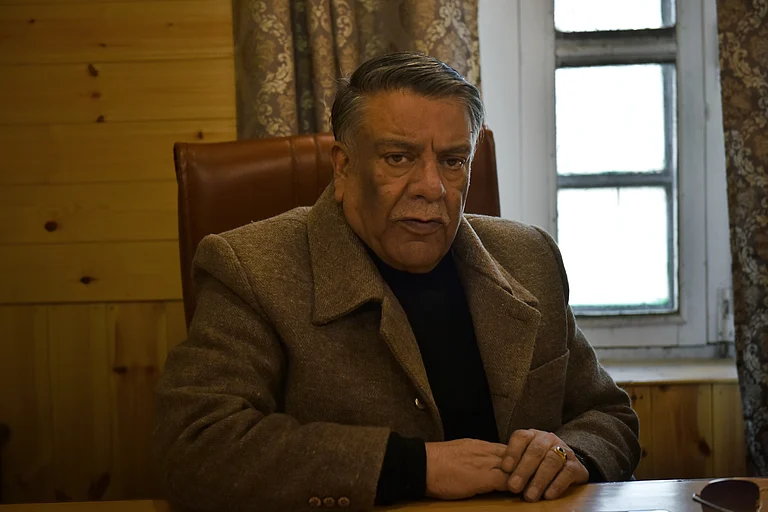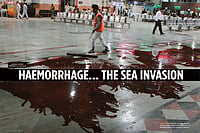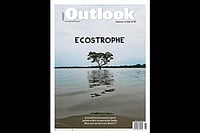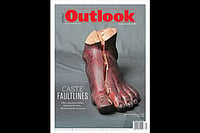NG: Why is this election important?
WP: This is about breaking the cycle of silence and suffocation in Jammu and Kashmir (J&K). People feel a lot of control and thought policing has been happening after the abrogation of Article 370 in 2019. We are going to the people, having conversations. More than seeking votes, we are trying to heal the people and ourselves as well. There was no space available for the past many years. A lot of people were detained or arrested. The political parties were newly created. Some were given space selectively, others were denied space. Forty people from the PDP left the party. They were former MLAs, MLCs, and MPs. There was a crackdown on the PDP for speaking truth to power. I think this election is the best opportunity to reach out to the people and recreate a connection with them.
NG: What has the response to your outreach been like?
WP: People have gone through a lot. They are cynical and depressed. There is, however, an urge to connect especially among the first-time voters. I have seen “boycott constituencies” coming to our programmes and rallies. So there is a silent constituency that is opting to vote because after the abrogation, the separatist space has diminished. The militant space has been completely eroded. Expression is democratised now. People see this election as a space to vent their thoughts and their anger. They want to exercise democratic resistance via the ballot.
CS: After the abrogation of Article 370, there seems to be complete silence in Kashmir. Why? What happened in the immediate aftermath of the abrogation?
WP: I think the moment the Kashmiri political class was detained, and former chief ministers were arrested, it sent out a message to everybody that no one is special here, that anyone can be detained, arrested and booked under stringent laws. There is a lot of pressure and fear in that sense. I was first detained and then arrested and booked under the Unlawful Activities (Prevention) Act (UAPA), terror laws by the National Investigation Agency (NIA) and the State Investigation Agency (SIA). This is the first time the government is using terror laws on political people, not the routine Public Safety Act. The terror laws are very stringent. The process itself is a punishment. Every month you have to attend the Court. There is no prosecution response. So people are consumed by these arrests. They have created an atmosphere of silence and nobody wants to talk. The government reads that silence as peace in many ways. It is a government indicator of normalcy.
CS: The PDP’s ideological basis was self-rule, where there were several pointers such as trade between Kashmir and PoK. What does self-rule mean in today’s context?
WP: I think self-rule is an evolving document and a futuristic solution. It is the only possible solution to Kashmir in many ways. It talks about the free movement of goods and people across the border, which is the future as India wants to play a bigger role in South and Central Asia and the world over. Jammu and Kashmir is located in a strategic place geographically and self-rule tries to use its geo-strategic location, where the borders become free. It is not a complex document like autonomy (the resolution of the National Conference). The self-rule document talks about intra-Kashmir relationships and inter-Kashmir relationships. Even abrogation of Article 370 is specific to this Kashmir. While self-rule mentions about banking, it is about cross-LoC trade, and it talks about the revival of all traditional routes. It is about connecting people socially across the borders. I think this is the future of Kashmir. You have the Kartarpur Corridor today. Ten years ago, no one could have imagined it happening. You have now a peace corridor in the name of religion and both countries are accepting it. I think the future revolves around self-rule and we are optimistic about it as it includes trade, and also talks about global warming. It is an evolving document that accepts whatever changes are happening in both countries.
CS: In the past four years a narrative has been built around “development”. The renovated clock tower in Lal Chowk has become a new tourist attraction. It looks to me like there are two Kashmirs: a tourist Kashmir and another underneath it…
WP: There are two narratives. One is the ‘Naya Kashmir’ narrative of this government. And there is the real Kashmir, which is beyond the optics, the photos, the clock tower, etc. You can see a lot of development, but these projects were not done by this government. Most of the smart city projects were initiated by the PDP government when Mehbooba Mufti was chief minister. The whole concept of the smart city was conceived by us. It takes time to get such plans implemented. Now they are taking credit for the work that was conceptualised and initiated by us. That doesn’t matter to us…For us, Kashmir is not a real-estate issue. Kashmir, however, is a human issue and it is here that the whole focus of this government is missing. They are doing infrastructure development but they are missing the human connection. That is why the BJP has not fielded any candidate from Kashmir. I think that the emotional connection is missing and with it, compassion.
CS: You had formed a government with the BJP, but it didn’t work out. After the abrogation of Article 370, your People’s Alliance for Gupkar Declaration (PAGD) also didn’t work out. So what is your narrative in this election, which is taking place after a long time?
WP: I think the alliance with the BJP didn’t work out due to multiple reasons. We thought the idea of the self-rule solution needed an endorsement from the Union of India even if you had a very right-wing government in power. But it is the constituency (the right-wing) in India that matters when it comes to resolving the real issues. We believed there was an opportunity to engage with ‘New India’ and a new government in New Delhi. It didn’t work because they ditched us. We had an Agenda of Alliance with the BJP, but then they left the government. We are not accountable for that. We, however, made an honest effort thinking this was a solution to many issues that were mentioned in the Agenda of Alliance. The PDP faced a huge setback on the ground because of our alliance with the BJP. Facing the people was a huge challenge. But PDP president Mehbooba Mufti has been a consistent voice during the last five years on people’s issues in Kashmir, on the concerns of Muslims, trade-related problems and employment. She has paid a big price for it. Her party was fractured completely. Her mother was questioned. Her family’s passports, as well as hers, were denied. Her father’s grave was investigated. Her own house was taken over. A lot of things have happened to her and people are acknowledging it.
CS: You are talking openly about getting the youth out of jails and about the silence prevailing in Kashmir. Aren’t you afraid of talking about these issues while being charge-sheeted under the UAPA? Also, what are your views on healing and restoring dignity?
WP: To be honest, I am afraid. I paid a huge cost. I was in a small, dark, windowless cell (during my detention) for a month. It was solitary confinement. I was in Delhi after being detained by the NIA. They used to take me outside for questioning repeatedly; scores of people would bombard me with questions.
CS: What does this confinement do to your mind?
WP: It breaks you. It breaks your will. You forget everything. It is a very painful phase. I was not a militant or a stone-pelter. I was a proper, pro-India activist with a lot of conviction. I started my activism from my school days. I have full faith in the Constitution and in India. When it happened, it took me a lot of time to process it.
CS: Did they give you anything to read in your cell?
WP: They don’t give you anything. No paper, nothing. Anyone can come to you, and pick you up in an interrogation cell. They will question you, humiliate you, take away your dignity. I was stripped, tortured. Thrashed and left naked. I don’t want to talk about it...This is happening to many Kashmiris locked up behind the walls of those cells.
CS: What did you remember during those days? Your family?
WP: Yes, it brings you closer to your family. You only remember your loved ones like your family. You miss them the most. I think you feel you are getting closer to religion and God. So much isolation brings God closer to you in many ways. You feel like you are talking to Him.
CS: Do you feel Kashmir has felt the same kind of isolation?
WP: In government, I was heading the PDP youth wing and also heading a youth programme. We had a whole set of definitions like misguided youth, rehabilitation of youth, mainstream youth. But once you land up in jail, in detention, it brings you closer to reality, and your whole vocabulary changes.
CS: What is that reality?
WP: It brings you closer to the pain and the trauma Kashmiris are going through and it also brings you closer to the reality that we never see. When a mother used to come to me saying her son was detained, we would help her and call the police. We would also tell her not to worry and that her son was safe. But when you are detained that’s when you really understand the pain. When I was questioned, humiliated, stripped, and videos were recorded, which are all off the books, you realise what is going on with others. Then there’s jail itself. The courts, the handcuffs, the process of humiliation. I think that makes people very bitter. You get nightmares. You cannot sleep. It traumatises people. I think there is the lava of anger boiling over. There is collective trauma.
CS: Did it make you bitter?
WP: Yes, but unlike other prisoners, I had an advantage. There were a lot of people speaking up for me. The former chief minister was talking on my behalf. The party was behind me. My family was pursuing my case. There were several lawyers in the high court and the Supreme Court pleading my case. It does make you bitter at times. You feel they are doing this to you as a Kashmiri when you have done nothing wrong. But I kept getting delayed reliefs from courts and that kept my belief alive. My first bail was given within 15 days as the Court took the stand that there was not a whisper against me. That gave me hope and a lot of strength to fight the second case. I went to the Supreme Court thrice. I got relief continuously, all three times. I think some institutions are still working and giving you hope.
CS: How do you heal?
WP: We are all traumatised; from top leaders to cadres. We are sailing in the same boat. But when you meet you give strength to each other. That is how Kashmir has survived.
CS: What do you say to people in your campaigns?
WP: We say we try to keep hope alive. We stand united. We also talk about the things people are going through, and what we are going through. It is happening to all of us and I think people relate to that conversation, whether it is a lack of jobs, resource exploitation, or delay in the democratic process of elections. You are in a village, you are isolated and you feel you are cornered. But when we are meeting people, talking to them at rallies, they feel it is collective. A shared pain. It becomes a process of healing and they feel that we as a people are going through the same thing.
CS: What about the omnipresent silence in Kashmir?
WP: I think they (Kashmiris) haven’t given away their minds to anyone yet. Kashmiris have been expressing themselves from 2019. It is difficult to judge whether they have accepted us or chosen to delay their response. Kashmiris tend to keep things to themselves. They have expectations from the Union of India, the hope that something will be given. They have not given up completely.
CS: Sometimes, they say, hope is your biggest enemy.
WP: But we have to survive because of hope. India has changed a lot. And so has politics. Hate has become a campaign now, which was not there earlier. Harmony is under threat. You feel dejected when you see what is happening to minorities in India. But then Kashmir is slightly different from the rest of India. We have our own strategic importance and every Kashmiri understands it. I think they may not articulate it, but they realise they may not be important politically. Strategically, they know they are important. The BJP government had to hold the G-20 meet they chose Kashmir. They brought the EU to Kashmir. When the Prime Minister had to do a first rally, he picked Kashmir. The Chief Justice had to hold a conference, he too preferred Kashmir. When these things are happening, they have to build a “smart city.” They have renovated Lal Chowk because of the strategic importance of Kashmir and Kashmiris understand it.
CS: If elected, what is the first thing you will do?
WP: My focus will be the youth of Kashmir as their future seems to be affected by perpetual pain and anxiety. They are gripped by a lot of insecurities, the abrogation of Article 370 being one of them. There is uncertainty about the future. There are financial, political and security-related insecurities. They are facing passport (denial) and verification issues. There is thought policing. There are cases against the youth of Kashmir. Kashmir needs a huge amnesty programme where everyone gets a chance to reclaim their life and be normal.


























